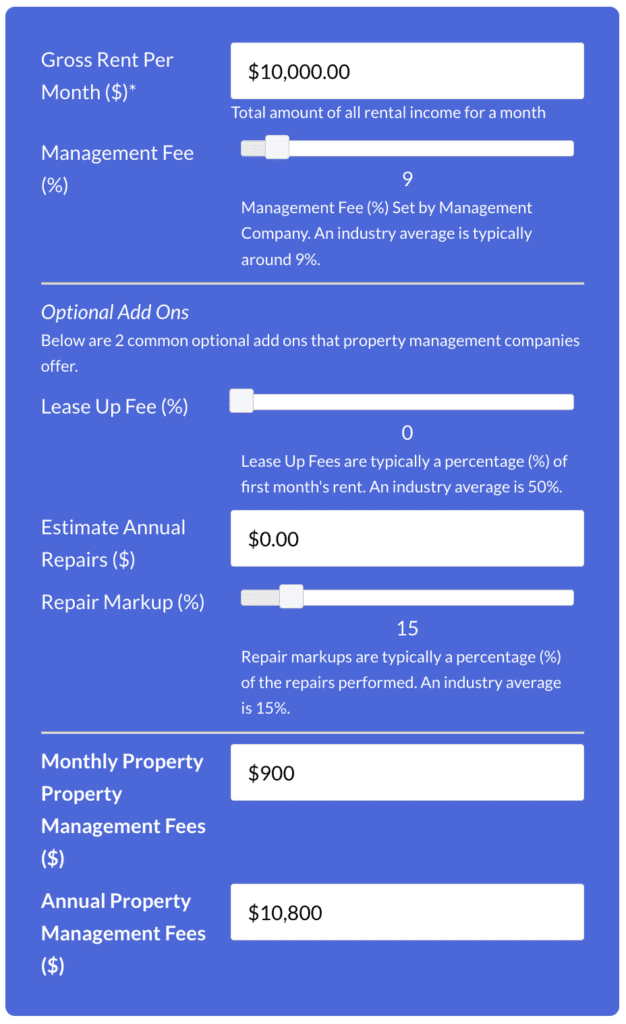Last Updated: January 2024

One of the biggest questions in rental property management is “Should I Self Manage my property or hire a Property Management Company?”. While single family rental properties may be manageable for newly starting investors, large multifamily apartments and commercial shopping centers almost always require professional management services. Below we take a look at both sides of the decision to self manage or hire a professional property management company.
20 Differences Comparing Self Management vs Property Manager
| Aspect | Self-Manage | Hire Property Manager |
|---|---|---|
| Initial Cost | None (unless you invest in management tools) | Fee (usually a percentage of the rent) |
| Time Commitment | High (especially if multiple properties) | Low |
| Control Over Processes | Total decision control | Depends on agreement; some loss of control |
| Legal Knowledge | Must learn and stay updated yourself | PMs usually are up-to-date with regulations |
| Tenant Screening | Your responsibility | Handled by PM |
| Maintenance Calls | Handled directly by you | Managed by PM |
| Relationship with Tenants | Direct | Intermediary (PM) |
| Rent Collection | Your responsibility | Managed by PM |
| Handling Emergencies | Must be available 24/7 yourself | PMs handle them |
| Vacancy Management | Your responsibility to market & fill | Managed by PM |
| Evictions | Must handle and understand legal procedures | PM can handle or assist |
| Financial Reporting | Must set up own system or manually track | PMs often provide regular financial reports |
| Knowledge of Local Market | Must research and understand yourself | Good PMs have local expertise |
| Stress Level | Can be high depending on issues | Reduced as many tasks are delegated |
| Contract Negotiations | Must handle yourself | Typically managed by PM |
| Property Inspections | Schedule and conduct personally | Managed by PM |
| Dealing with Vendors | Must find, negotiate and manage yourself | PM often has a network and manages them |
| Continuing Education | Responsibility to stay informed on property management best practices | PMs usually undergo regular training |
| Marketing and Advertising | Your responsibility to fund and manage | Typically handled by PM |
| Property Upgrades/Improvements | Decide and manage yourself | PM can suggest and coordinate |
| Tax and Expense Tracking | Must handle all tax-related documentation and expense tracking | Some PMs provide tax documentation |
Self Managing Rental Properties


What is Self (Property) Management?
Self (property) management is a type of rental property management where the actual property owner directly oversees and handles all of the day-to-day operations to manage the rental property.
Pros and Cons of Self Managing Rental Real Estate
Self managing a rental property can sometimes lead to great outcomes such as cost savings and obtaining hands-on real estate industry knowledge. In other cases, it can be a burdensome experience that should have been handled by a professional in retrospect. Here are a few Pros and Cons of self managing rental properties to consider before making your decision to self manage or hire a property manager?
Self Managing Pros
1. More Cost Effective – Probably the most common reason for choosing to self-manage an investment rental property is due to cost. With third-party management companies charging between 5% -15% it makes more economic sense for some investors to self-manage. For example, if a local property management company charges 10% of the monthly income, that means that by the end of the year they’ll have charged you more than 1 month’s rent, and that’s 10% X 12 months = 120%.
2. Greater Control of the Property – Unfortunately, owners and property managers do not always entirely see eye-to-eye. Whether it is a design decision or selecting the most qualified tenant, self managing allows you to have the final call. This usually results in quick and decisive decision making since you naturally only want to make decisions that you believe are best for your business.
3. Opportunity to Learn – Self managing your investment allows you to learn about your property and also the general business of managing investment rental real estate. From annoying maintenance requests, to properly screening prospective tenants, you will have to deal with it all. The good news is that the more you learn about your business, the easier it will be for you to grow it.
Self Managing Cons
1. Very Time Consuming – Even if you enjoy taking care of your investment property, unless you have a lot of spare time, you may find it difficult to properly give your investment property the time it requires of you. From maintenance requests, to paying bills, and properly screening prospective tenants, there is a lot of oversight required which all needs to be addressed promptly (Yes, even the 3am overflowing toilet floods).
2. Lacking Professional Expertise & Presence – You may have a lot of hands-on experience, but property management is such a vast field of topics that it is nearly impossible to stay on top of all the changing laws and regulations. Furthermore, maybe it’s human nature, but tenants seem to respect actual companies more, even if its just a DBA and Google Voice phone number.
3. Rent Collection and Handling Evictions – We may plan for everyone to promptly pay their rent on the 1st of every month, but that is just not the case in rental real estate. This means you may end up needing to follow up with some renters every month to get them to pay on time. In the unfortunate event a tenant decides they’re simply not going to pay, you will then have to start and see-through the legal process of eviction.
Hiring a Property Manager


What is Professional (Property) Management?
Professional property management is the comprehensive oversight and administration of a rental property by a dedicated company or individual on behalf of the property owner.
Pros and Cons of Hiring a Property Manager
Hiring a property management company (instead of self-managing) can bring about great peace of mind that your rental property investment is in good hands. However, not all professional property management companies have stellar reviews, which often point out the lackluster experience that some property owners have with them. Here are a few Pros and Cons of hiring a professional property manager for your rental property, to consider before making your decision to self manage or hire a property manager?
Property Manager Pros
1. Ease of Mind – Property management can be very stressful, regardless of how great your tenants are. Outsourcing this obligation to a property manager frees up your time to either continue growing your business by focusing on new acquisitions, or just enjoying life without worrying about getting a late night maintenance phone call.
2. Maintenance Response – Depending on the size, larger property management companies have dedicated 24-hour phone lines and available tradesmen to handle emergencies no matter the time. Even if they do not have maintenance staff directly employed, all property management companies have relationships with local vendors to get any job done quickly and effectively.
3. Enabling Growth and Scaling Up – If you’ve already gotten your feet wet self-managing, hiring a property manager might be a wise decision to help you scale up your business. Nobody knows the ins and outs of the rental industry more than property managers, and a good one can help you handle the mundane tasks and also pass along valuable market knowledge and insights.
Property Manager Cons
1. Cost of Services – The most common complaint of hiring a property management company is the cost. Fees vary depending on the services offered, but are usually a percentage or monthly rent. On top of the recurring base monthly charge, they may also charge a leasing fee, setup fee, cancellation fee, extra maintenance fees, renewals fees, etc.
2. Giving up Control of Your Property – Hiring a property management company means you are willing to hand over the day-to-day operations of your rental property. Should you choose to do so, you will need to accept the fact that they may not approach every issue the same way you would. For example, some property managers may work remotely, where you are a hands-on type of owner.
3. More Expensive Maintenance – Maybe you have a cousin who could unclog a drain for $20 and free lunch, however, the property manager is going to call a licensed plumber for that same job. Should you choose to have the property management company handle your rental property maintenance, you will need to be comfortable paying marked up prices for professional tradesmen to perform maintenance.
Answer: A Hybrid Approach to Property Management


Now that we’ve scrutinized both sides of the question to self manage or hire a property management company, we’ll offer a third viewpoint to consider: Perhaps the most effective strategy is hybrid property management.
In a hybrid property management setup, you could start out self managing to learn the ins-and-outs of property management and eventually switch over to third-party management once the time commitment no longer makes economic sense. These types of rental property owners possess an immense advantage whereas they understand the operations of management of their investment, however choose to outsource it to other capable professionals to free up time and resources that can be used to pursue other business ventures or just enjoy life less interrupted.
The #1 Rental Property Newsletter
Once a month, we send out an exclusive Rental Property Market Update with top stories, current mortgage rates, building products, and more. No spam and unsubscribe anytime.


Self Manage or Hire Property Manager FAQ
How Many Hours Are Required to Manage a Rental Property?
The amount of time that will be needed to manage a rental property will mostly depend on the number of tenants (i.e. doors) that the property has. The general rule is more tenants equals more time required to manage. A single family home might require only a few hours a month to manage, whereas a large mid-rise multifamily apartment with hundreds of tenants will require a full time schedule of 40 hours per week minimum. As the person in charge, property managers are required to be on call 24/7 to handle any after hour emergencies as well.
What Services Can a Property Management Company Provide?
Property management companies offer a range of services tailored to the unique needs of the property and its ownership. Depending on whether property management is full service, partial service, or a la carte, these services can include tenant screening and placement, rent collection and lease administration, and property maintenance and repairs, and more.
Search Rental Real Estate
Try searching out site for hundreds of rental property topics ranging from property management, investor tool reviews, investment research, and more.
How Much Will Hiring a Property Manager Cost?
The average property management fee for a rental property in the United States is approximately 9% and falls between 6% – 12%. These charges can vary based on factors such as the scope of service (full service vs. partial service), the type of property, location, size, and the range of services required. Some companies may include all services for one monthly payment, and others may bill each service separately.
Try Our
Property
Management
Cost
Calculator →
100% Free – No Sign Up Required
About the Author


Ryan Nelson
I’m an investor, real estate developer, and property manager with hands-on experience in all types of real estate from single family homes up to hundreds of thousands of square feet of commercial real estate. RentalRealEstate is my mission to create the ultimate real estate investor platform for expert resources, reviews and tools. Learn more about my story.





